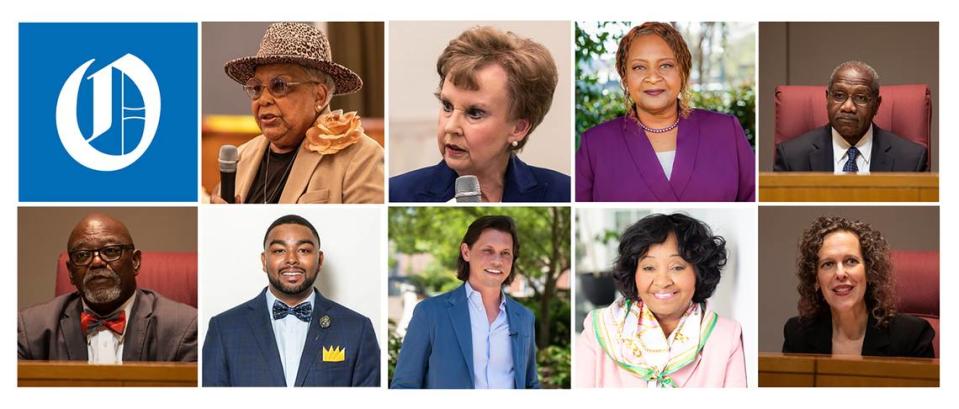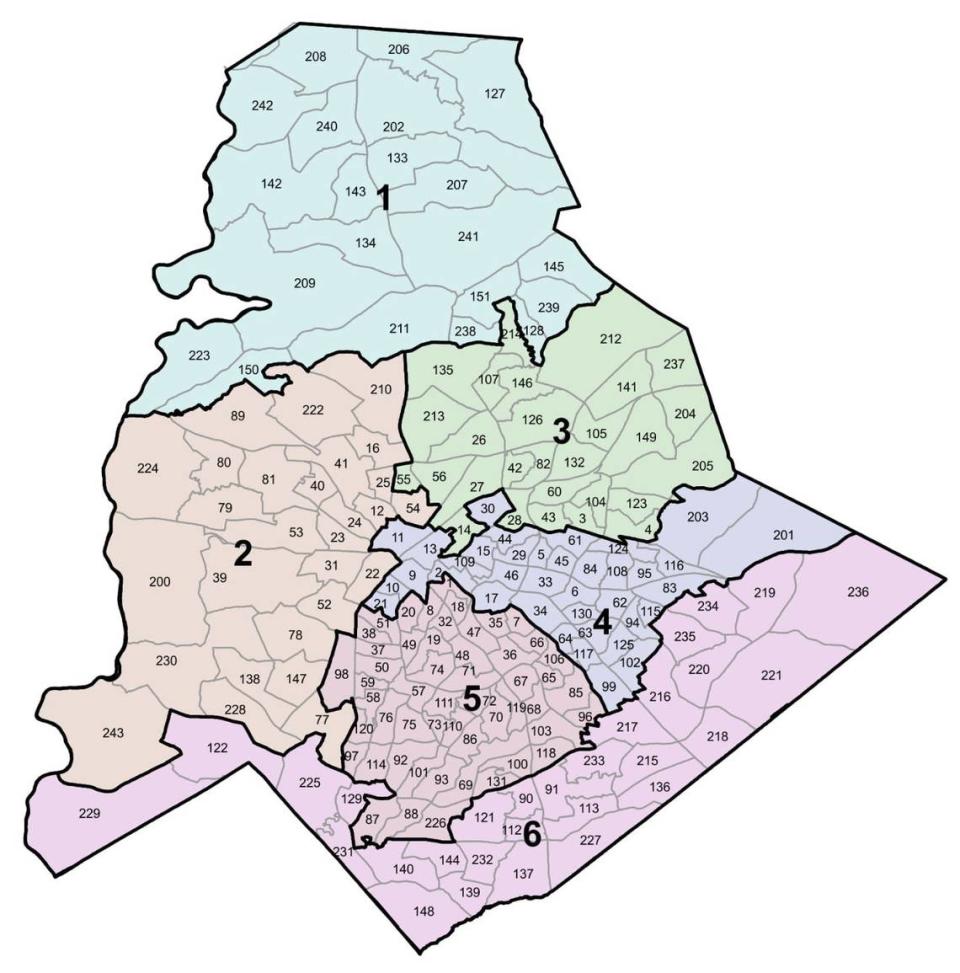What are Mecklenburg’s biggest issues? Commissioner candidates reveal their answers
From housing and jobs to education and safety, nine candidates running in the Mecklenburg County commissioner Democratic primary point to a range of topics as the most important issues facing the community.
Five candidates are running for three at-large seats, including three incumbents. No Republicans filed for at-large seats. So, the winners of the Democratic primary will not face opponents in November’s general election.
All district incumbents are seeking reelection. Of them, Chairman George Dunlap faces a Democratic primary challenger in District 3, as does District 2 Commissioner Vilma Leake. District 2 mostly covers west Charlotte. District 3 stretches out from the uptown area toward north and east Charlotte.
There are no Republican primaries for district seats on the county commission in 2024.
When Mecklenburg voters cast their ballots on March 5, they will choose a single candidate in each of the district races, and up to three candidates in the at-large races.
Here’s what the candidates had to say when asked about the biggest issues facing Mecklenburg County today.

Transportation and workforce development
Leigh Altman, 51, one of the Democratic at-large incumbents running for re-election, pointed to two areas of concern: jobs and transportation.
Altman, who has served two at-large terms on the commission and one term in District 4, said she wants to focus on bringing the county “great jobs” by working to “attract and retain industries and strong employers for our residents.”
She also said collaborating with regional partners to “build support for a new source of revenue” for light rail and bus service will help residents access affordable housing, jobs, health care and a higher quality of life. It will also reducing traffic congestion and car emissions, she said.
In September, Altman, and a group of mayors from surrounding towns, pushed to give more power and oversight over the Charlotte Area Transit System to the Metropolitan Transit Commission following concerns about a Blue Line light rail derailment.
“A safe, reliable, and effective public transit system is necessary for our next stage of growth,” Altman said.
Incumbent Arthur Griffin, 76, is more concerned with the “vanishing middle class,” saying it is the “greatest problem facing Mecklenburg County in the next decade.”
Griffin, who was elected to the board in 2022 and served nearly two decades on the Charlotte-Mecklenburg Board of Education, said he would focus on developing “our local human assets” through workforce development to help fill “the void” in the county’s “dwindling” middle class.

Keeping up with county’s growth
Census data show Mecklenburg County grew 1.74% between 2021 and 2022, with sharper rates in neighboring counties.
Pat Cotham, 74, a third incumbent running at-large for her seventh term, said she wants to make sure the county is keeping up with its growth in new residents. It will take a “Big Idea” group to tackle the problems that come with that growth, Cotham said. She pointed to the county’s youth as a starting point.
“Many community leaders who are helping our youth feel disconnected and sidelined,” Cotham said. “We have an educated and highly experienced group of retirees who want to get involved but finding an entry point is a challenge. We need more connection with resources and centers of influence.”
She also said communication needs to be improved, pointing to a program that was meant to help seniors pay tax bills, but “struggled to get applicants.”
At-large challenger Blake Van Leer, 42, like Cotham, pointed to the county’s growth as an area of concern.
But for Van Leer, an entrepreneur and investor, the focus should be on making sure “our community and its people are not left behind” by providing more resources for schools, parks, affordable housing and the health and mental health systems.
Additionally, Van Leer said he wants to “bring a fresh perspective” by incorporating new technology into the board’s work and projects with “real time metrics” and reports that will be transparent. He also wants to see educators have resources and support they need to teach students skills that may not require a degree.
Education comes into focus
Yvette Townsend-Ingram, 53, the other at-large challenger, pointed to education as a key issues facing the county, as well as “safe, equitable housing; food security, especially in the 6 zip codes deemed food deserts; and reducing gun violence.”
The Charlotte-Mecklenburg Police Department has raised the alarm about increased youth violence and crimes, including those involving shootings. In 2023, there was an 18% increase from the year before in shootings involving juveniles. Police also named 108 juveniles as suspects in shootings — a 33% increase.
Townsend-Ingram, the director of foundation relations at Johnson C. Smith University, said she would “champion” the reconvening of the intergovernmental committee, so there can be a joint effort on challenges that are “overlapping.”
“Our government entities work independent of the other too often and place all the responsibility on one agency,” said Townsend-Ingram, who previously ran for the board a couple of years ago. “That must change.”
In District 2, incumbent Vilma D. Leake sees the quality of education and the lack of minority teachers, especially Black male teachers, as the biggest issue in the county.
In order to address the problem, Leake, who was first elected to the board in 2008, said she has invited presidents of Black colleges to meet in Charlotte with the superintendent and two other leaders.
Charles Osborne, 32, an entrepreneur who is challenging Leake in District 2, said he also saw education as a key issue. But he also sees economic development and community safety as areas that need attention.
“I plan to boost economic growth by supporting local businesses in District 2 and providing employment opportunities, which will ultimately contribute to a thriving local economy,” Osborne said.
Homelessness and previous accomplishments
Felicia R. Thompkins, 64, a talent acquisition consultant who is challenging incumbent George Dunlap in District 3, pointed to homelessness as a major concern, particularly with children and women. Thompkins said she wants to revisit how other places have approached the issue and have conversations about how to proceed.
Dunlap, 67, who was first elected to the board in 2008, is focused on what the commission has been doing well thus far. He pointed to safety as the biggest challenge in the community.
He highlighted recent efforts such as investing in affordable housing, attracting new jobs, and “moving the district in the right direction” with new Superintendent Crystal Hill.
Part of those efforts: Last July the City Council and County Commissioners voted to approve a combined $7 million to preserve and renovate affordable housing units at Brookhill Village Apartments, where the average annual household income is $23,200, and the average monthly rent is $466. In 2022, the commission approved the purchase of a $10.5 million hotel in southwest Charlotte to provide housing and social and health services for people experiencing chronic homelessness.
“I believe that the Commission is doing well in all areas,” Dunlap said. “I think that we are in a good place.”
All members of the Board of County Commissioners serve a two-year term.
Early voting for the 2024 primary election will start Thursday February 15, 2024 and will end on Saturday, March 2, 2024.
Mecklenburg County residents can check their voter registration status and polling location the county’s website.

